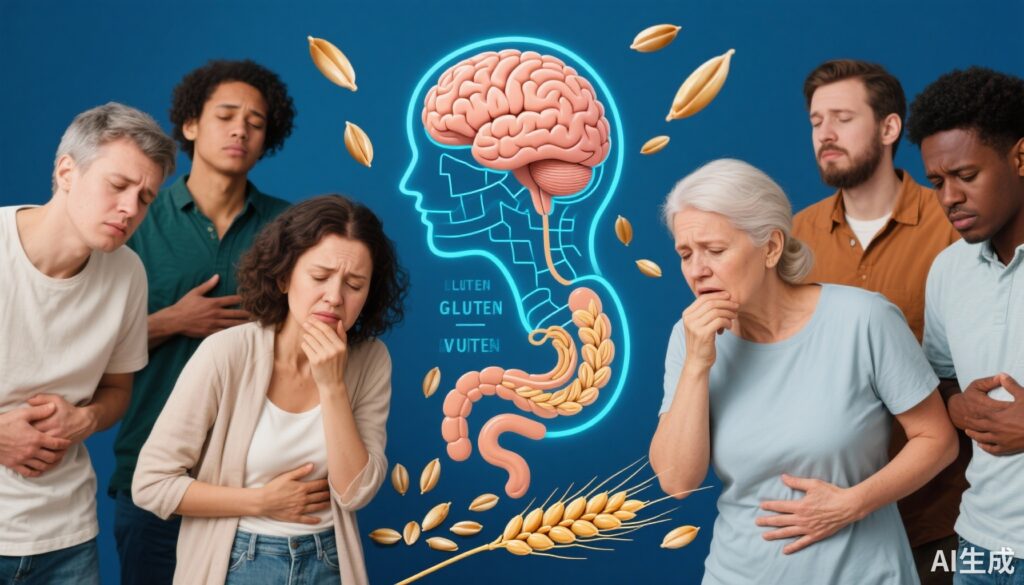Introduction
Nonceliac gluten/wheat sensitivity (NCGWS) has emerged as a significant but poorly understood gastrointestinal syndrome worldwide. Unlike celiac disease, which is a well-defined autoimmune disorder triggered by gluten, NCGWS is characterized by symptoms linked to gluten or wheat ingestion in people who do not have celiac disease or wheat allergy. Recent large-scale research shows approximately 10% of the global population self-report NCGWS symptoms, making it a highly prevalent yet controversial condition. The complexity arises due to the absence of reliable biomarkers, variability in symptoms, and overlap with other digestive and psychological disorders. Understanding NCGWS is critical for healthcare providers to improve diagnosis, avoid unnecessary dietary restrictions, and tailor management strategies.
What Is Nonceliac Gluten/Wheat Sensitivity?
NCGWS is a condition where individuals experience gastrointestinal and extraintestinal symptoms related to the ingestion of gluten or wheat products, despite ruling out celiac disease and wheat allergy through appropriate testing. Symptoms often include bloating, abdominal discomfort, abdominal pain, fatigue, and neuropsychiatric complaints such as anxiety or depression. Unlike celiac disease, which causes intestinal damage detectable on biopsy and specific serological markers, NCGWS currently lacks objective diagnostic tests, relying mainly on patient history and symptom response to gluten or wheat avoidance.
Global Prevalence and Demographics
A landmark systematic review and meta-analysis led by Mohamed G. Shiha, MBBCh, from the University of Sheffield, analyzed data from 25 studies encompassing nearly 50,000 participants across 16 countries. The findings, published recently in Gut, highlight several critical epidemiological features:
– Approximately 1 in 10 people worldwide report symptoms consistent with NCGWS.
– Women are over twice as likely as men to report NCGWS, with an odds ratio of 2.29.
– The prevalence varies widely across regions, from as low as 0.7% in Chile to as high as 35.8% in Saudi Arabia.
This wide variation reflects differences in dietary habits, cultural perceptions of gluten, and possibly genetic or environmental factors influencing symptom reporting.
Clinical Characteristics and Symptoms
Among those reporting NCGWS, the most common symptoms include:
– Bloating (71%)
– Abdominal discomfort (46%)
– Abdominal pain (36%)
– Fatigue (32%)
In addition to physical symptoms, the study revealed strong links with psychological distress:
– Individuals with NCGWS were nearly three times more likely to report anxiety (OR 2.95) and depression (OR 2.42) than controls.
– They were almost five times more likely to have irritable bowel syndrome (IBS) (OR 4.78), a disorder considered part of the broader disorders of gut-brain interaction (DGBI).
These data suggest that NCGWS symptoms may be mediated by complex interactions between the gut and the brain, involving psychological health and gut motility or sensitivity.
Misunderstandings and Challenges in Diagnosis
The recognition of NCGWS is complicated by several misconceptions:
– Many people self-diagnose gluten sensitivity without medical evaluation, often influenced by popular media or diet trends.
– There are no blood tests or biomarkers currently validated for diagnosing NCGWS, making objective diagnosis difficult.
– The symptoms overlap with other conditions such as IBS, functional dyspepsia, and food intolerances.
Dr. Christopher Cao, director of the Celiac Disease Program at Mount Sinai, highlights that NCGWS “may be more than just a gluten-mediated process.” Emerging evidence points toward a role for other wheat components and fermentable carbohydrates, as well as disordered gut-brain signaling.
Moreover, strict adherence to a gluten-free diet without celiac disease may pose nutritional risks, increase financial burden, and contribute to social isolation.
The Gut-Brain Axis and Psychological Comorbidities
The strong association between NCGWS and psychological distress suggests a bidirectional communication between the gastrointestinal tract and the central nervous system, termed the gut-brain axis. Stress, anxiety, and depression may alter digestive function and pain perception, often exacerbating symptoms.
This interplay underlines the importance of a holistic approach to NCGWS management, considering both physical and mental health aspects.
Current Management Approaches and Future Directions
Currently, the mainstay of managing NCGWS is a gluten-free diet, which nearly 40% of self-reporting individuals follow. However, many patients continue to experience symptoms despite dietary adherence, implying that gluten may not be the sole trigger.
Shiha and colleagues advocate for:
– Developing symptom-based diagnostic criteria integrating the DGBI framework.
– Classifying NCGWS as part of disorders of gut-brain interaction to acknowledge its complex pathophysiology.
– Exploring multidisciplinary interventions targeting dietary triggers beyond gluten, psychological support, and gut motility.
Further research is essential to delineate clear clinical phenotypes, understand the underlying mechanisms, and develop evidence-based guidelines. Nutritional counseling remains crucial to avoid deficiencies commonly seen with unsupervised gluten-free diets.
Patient Scenario: Lisa’s Journey with NCGWS
Lisa, a 34-year-old marketing professional from Chicago, began experiencing bloating, abdominal discomfort, and fatigue after meals containing bread and pasta. Concerned, she consulted her primary care physician. Tests ruled out celiac disease and wheat allergy, but symptoms persisted. After adopting a gluten-free diet following medical advice, Lisa’s symptoms improved but did not completely resolve. Further evaluation revealed coexisting anxiety and IBS.
Lisa’s care team included a gastroenterologist, dietitian, and psychologist, employing dietary modifications tailored to her symptom triggers, cognitive behavioral therapy to manage anxiety, and medications for IBS symptoms. Over six months, she noted significant improvements in both gastrointestinal and psychological symptoms.
Lisa’s case illustrates the complexities of NCGWS and the necessity for an integrated approach addressing symptom heterogeneity and psychological comorbidities.
Implications for Healthcare Providers
Primary care doctors and gastroenterologists should be aware of the growing prevalence of NCGWS and its overlap with IBS and psychological conditions. Key practice points include:
– Thorough evaluation to exclude celiac disease and wheat allergy before considering NCGWS.
– Counseling patients on the potential risks and benefits of gluten-free diets.
– Screening for anxiety and depression in patients with persistent gastrointestinal symptoms.
– Collaborating with dietitians and mental health professionals for comprehensive management.
Conclusion
Nonceliac gluten/wheat sensitivity affects a significant portion of the global population, predominantly women, and is closely linked with psychological distress and irritable bowel syndrome. Despite being common, it remains poorly defined due to the absence of specific diagnostic tests and overlapping symptoms.
The study led by Dr. Shiha and colleagues opens new perspectives by proposing NCGWS as part of the disorders of gut-brain interaction and calling for symptom-based diagnostic criteria and multidisciplinary treatment approaches. Patients like Lisa underscore the need for personalized care that addresses both physical and mental health.
Healthcare providers must balance validating patients’ experiences with evidence-based practice, avoiding unnecessary dietary restrictions while improving quality of life. Future research aimed at unraveling the pathophysiology and developing targeted therapies will be vital to transforming care for those affected by NCGWS.
References
Shiha MG, Manza F, Figueroa-Salcido OG, Ontiveros N, Caio G, Jansson-Knodell CL, Rubio-Tapia A, Aziz I, Sanders DS. Global prevalence of self-reported non-coeliac gluten and wheat sensitivity: a systematic review and meta-analysis. Gut. 2025 Oct 28:gutjnl-2025-336304. doi: 10.1136/gutjnl-2025-336304. Epub ahead of print. PMID: 41151790.
Additional reading:
– Sapone A, Lammers KM, Mazzarella G, et al. Non-celiac gluten sensitivity: the new frontier of gluten related disorders. Nutrients. 2012;4(10):3569-3582.
– Marietta EV, Murray JA, Lammers KM. Mechanisms of nonceliac gluten sensitivity. Gastroenterology. 2019;156(7):1912-1921.
– Chey WD, Kurlander J, Eswaran S. Irritable bowel syndrome: a clinical review. JAMA. 2015;313(9):949-958.
Funding and Clinical Trials
No specific funding was disclosed for the referenced systematic review. Clinical trials investigating the pathophysiology and management of NCGWS are ongoing but limited. Researchers encourage multidisciplinary collaborations to advance understanding.



